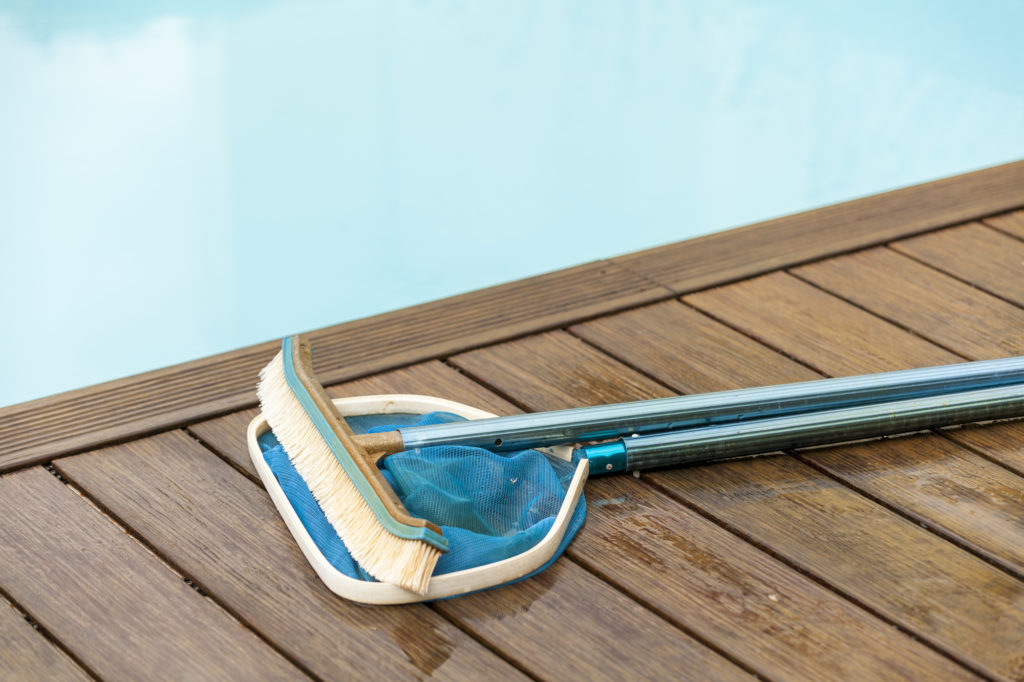
Pools make fantastic additions to any home.
Not only do swimming pools offer a fun way to relax and cool off, they can also look amazing.
But, for as fun as they are, pools do come with a downside. They need a lot of maintenance.
While you could hire a maintenance service to clean and care for your pool, these kinds of services can be expensive.
Fortunately, pool maintenance is not rocket science. With a little guidance, you can take care of your swimming pool yourself which could wind up saving you a lot of money.
Not sure where to start?
Here’s everything you need to know about cleaning and caring for your pool.
Cleaning
Nobody wants to go swimming in a pool full of slimy leaves and dead bugs.
Keeping your pool clean is the most reliable way to ensure every other aspect of pool maintenance runs smoothly.
The goal with cleaning is to make sure your pool looks its best and is free of any debris.
There are a few tools you’ll need for necessary cleaning that are vital to maintaining the health of your pool.
Skimmer
Your pool skimmer is your primary way of keeping your pool free of debris.
There are two kinds of skimmers and both are essential to keeping your pool clean.
Built-in skimmers collect large debris as your pump circulates water. These keep larger items like leaves and twigs from getting into and breaking your pump.
Handheld skimmers are large flat nets usually at the end of a long pole. These are best used for spot cleaning and perfect to take advantage of before you use your pool.
Brush
Your brush is for scrubbing algae and mold from the edges of your pool and keeping your pool deck free of dirt and loose debris.
Keeping your pool deck clean and sealed will make keeping your pool clean a lot easier. If you need to seal your pool deck, you can find more info here.
Cleaner
Think of your cleaner as a vacuum for your pool. Your cleaner connects to your pool pump and sucks up dirt and debris from the bottom and submerged sides of your pool.
Cleaners are essential for picking up anything the skimmer cannot reach.
Circulation
Standing water will collect dirt and debris faster than moving water. Not only that, still water could become a haven for mosquito larvae.
A pool pump’s only job is to keep the water flowing, which allows your pool to keep itself clean all on its own.
You should run your pump every day for at least one hour for every 10 degrees. So, if it’s 84 degrees, you should leave your pump running for at least eight hours.
Filtration
Your pool’s filter will catch any undissolved debris that is too small for the skimmer to pick up.
While your pool’s filter handles keeping your pool clean, you are responsible for keeping your filter clean.
Depending on the type of filter your pool has, you may need to backwash or rinse your filter your filter after a given amount of time.
Sand Filter
These filters work by reversing the water flow in your pool. Sand filters do their best work when they’re already dirty, and you usually only need to clean it once a season.
Cartridge Filter
While cartridge filters can keep your pool cleaner, they are much more difficult to clean.
If you have this kind of filter, you may want to consider investing in a few spare cartridges so you can keep your filter running.
Chemistry
With all the dirt and debris out of the way, it’s time for the final, most confusing, and most important part of pool maintenance.
Maintaining your pool yourself means you’re going to have to deal with the chemistry involved in keeping the water clean and safe.
While this part can be tricky to master, once you have it down you’ll be able to keep your pool healthy and pristine for years to come.
Calcium
Calcium buildup can damage the lining of your pool, and healthy levels depend on the makeup of your pool.
The safe range for calcium in your pool can range between 200- 250 parts per million, ppm, for concrete pools, and 175-225 ppm for vinyl.
Alkalinity
On average the alkalinity level in your pool should fall somewhere between 120-150 ppm.
If the alkalinity levels are low in your pool you should use an alkalinity booster to raise them back to appropriate levels. If your alkalinity levels are too high you’ll need to consult a professional pool maintenance service.
Sanitize
While most pool owners use chlorine to keep their water clean, you could also use bromine.
If you decide to use chlorine, you should consult a pool maintenance service to determine the best method for adding chlorine. Once you decide on a technique you should try to keep chlorine levels between one and three ppm.
If you’re thinking about using bromine, you can use bromine tablets to keep your water clean. But, the best way to use bromine in your pool is by installing an automatic brominator.
Shock
To keep your pool from getting cloudy, you’ll need to shock it on a regular basis.
It’s important to remember to stay out of the water after shocking your pool for one full filter cycle. One full cycle usually takes somewhere between two and four hours.
Off-Season Care
Unless your pool is indoors, or you live in a tropical climate, there will likely come a period of time where you can’t use your pool.
When the off-season rolls around, there are a few things you’ll need to do to prepare your pool for cold weather.
Check your pool for any cracks or damage, cold weather will only exacerbate any of these issues, so it’s best to take care of any damage before it gets too cold.
Once you’ve established that your pool is ready for covering, remove all objects from your pool and check the pH levels one last time.
Drain all the water from your pump, filter, and any other system you may have in place to protect against freezing. Then, lower the water level in your pool so it’s below the pool return.
Finally, cover your pool with a pool safety cover. You should check this cover every few weeks for tears or holes.
Keeping Up With Pool Maintenance
Keeping up with pool maintenance may seem like a lot of work at first, but, with a little practice, it becomes second nature.
By following this guide, you’ll be able to get the hang of cleaning and caring for your pool in no time. Which, will give you more time to actually go out and enjoy it.
Looking for more homecare tips and tricks? We have dozens of articles that will help you get your house in shape, so visit us today!

